Promote Vietnam’s economic growth, focusing on digital transformation and green transformation
NDO – On the morning of June 26, in Dalian city, China, Prime Minister Pham Minh Chinh chaired a discussion session in the form of a working breakfast with Professor Klaus Schwab, Founder and Chairman of the World Economic Forum. (WEF) and about 20 leaders of major WEF corporations.
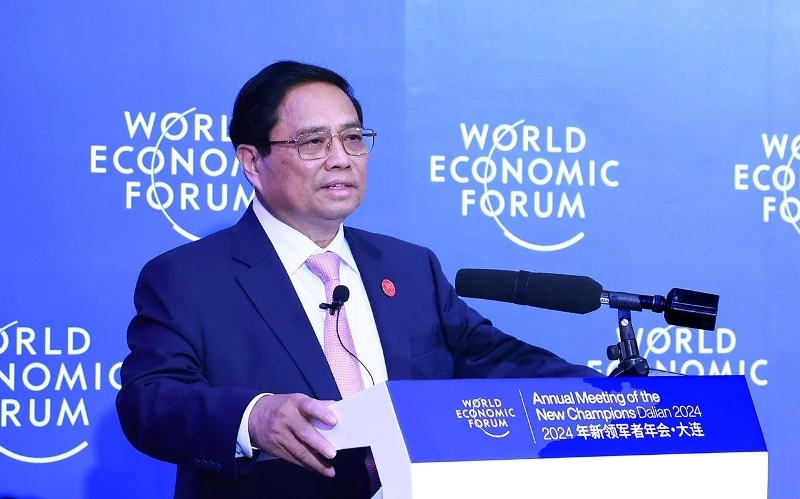 |
| Prime Minister Pham Minh Chinh spoke at a discussion session with leaders of major corporations at WEF. |
The focus of the discussion session is strengthening cooperation to promote Vietnam’s economic growth; focusing on digital transformation, high technology, green transformation and Vietnam’s role in the global supply chain.
The delegates shared and dialogued in the spirit of openness, sincerity, and frankness, looking forward to new opportunities for cooperation in the coming time that will become increasingly effective, in-depth, substantive, and sustainable. Opinions highly appreciated Vietnam’s growth, development, and increasingly improved investment and business environment, especially the digital economy which by 2023 will account for about 16% of GDP.
Professor Klaus Schwab said that WEF is very pleased to have a close cooperative relationship with Vietnam – a fast-growing bright star of the world economy.
Mr. Brand Cheng, Chairman and CEO of Foxconn, recalled that at a meeting in January last year, he reported to Prime Minister Pham Minh Chinh about placing an additional factory in Vietnam and this factory started production in January. 4 recently. This is an example showing Vietnam’s determination in economic development. To date, Foxconn factories are present in 5 provinces with 80 thousand employees and a total investment of about 4 billion USD. “Vietnam is developing fast and we develop with Vietnam,” he said.
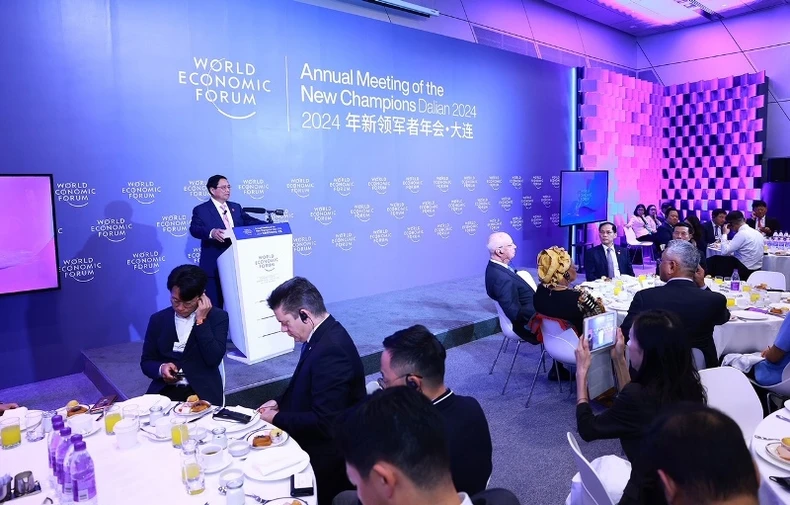 |
| Scene of the discussion session between Prime Minister Pham Minh Chinh and leaders of major WEF corporations. |
A Pepsico representative said that after 30 years, the company has invested 850 million USD in Vietnam and will continue to increase investment, especially in the fields of agriculture and food processing, promoting support for businesses. Small, recycled plastic.
In addition, comments also expressed interest and asked questions about a number of issues and areas such as completing regulations and policies related to the digital economy and green transformation such as electronic signatures in the field of digital economy. banking and finance sector; green certificates; ensuring electricity supply and energy conversion ; financing for renewable energy; Preferential policies for high-tech fields.
Speaking at the discussion session, Prime Minister Pham Minh Chinh reviewed some major features of the current world situation as the consequences of the Covid-19 pandemic persist; Factors such as polarization, tension, conflict, strategic competition, climate change… affect the world economy and countries.
In that context, the Prime Minister said that Vietnam is choosing to prioritize growth; At the same time, take measures to control inflation, stabilize the macroeconomy, and ensure major balances of the economy. As a result, in 2022, Vietnam’s GDP will grow by 8.02%, in 2023 will reach 5.5% and in 2024, the first quarter will reach 5.66%, the second quarter is estimated to be higher than the first quarter and continue the upward trend. than in the second half of the year. The macroeconomy is basically stable, inflation is controlled, and major balances of the economy are guaranteed. Public debt, Government debt, and foreign debt are much lower than allowed limits. The Vietnamese currency is still in the group with the least devaluation compared to other countries in the region.
Sharing future directions, Prime Minister Pham Minh Chinh said that Vietnam continues to prioritize growth, with large groups of solutions. That is, implementing proactive, flexible, timely and effective monetary policies, especially reducing lending interest rates, freezing debt, rescheduling debt and keeping appropriate exchange rates stable; Coordinate synchronously and harmoniously with reasonable, focused, and key expansion fiscal policies, continue to exempt, reduce, and defer taxes, fees, and charges and promote public investment.
Regarding trade policy, Vietnam advocates diversifying markets, products, production chains, supply chains, effectively exploiting existing FTAs, traditional markets and expanding new markets, supporting and promoting trade liberalization.
Along with that, Vietnam continues to maintain macroeconomic stability, control inflation, public debt, government debt, and foreign debt within allowable limits; ensure major balances of the economy (budget revenue and expenditure, import and export, ensure food, foodstuff, electricity and energy supply, and a labor market that meets the transformation).
Vietnam focuses on promoting three strategic breakthroughs in institutions, infrastructure, and human resources. In particular, identifying institutions as resources and driving forces for development, the Prime Minister said that a Steering Committee will soon be established to review and remove obstacles and bottlenecks in mechanisms and policies, headed by the Prime Minister himself, while Ministers will directly direct the review, construction, and improvement of institutions in their respective fields.
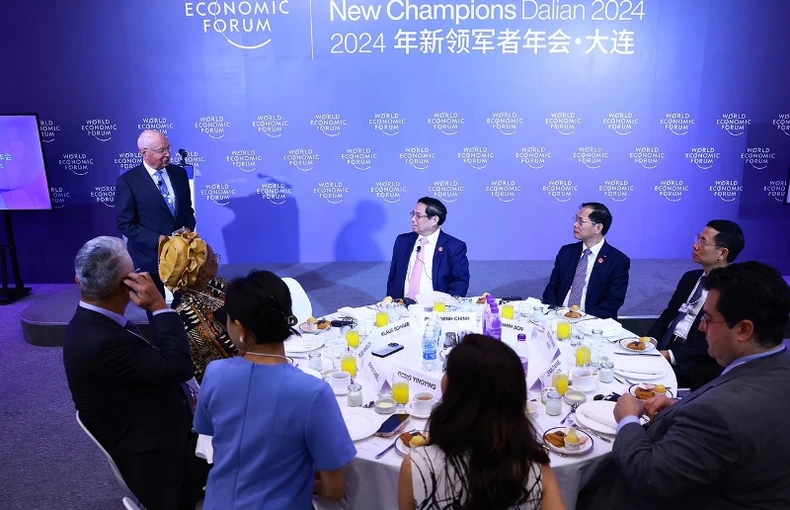 |
| Professor Klaus Schwab, Founder and Executive Chairman of WEF, spoke at the dialogue session. |
In terms of infrastructure, Vietnam synchronously develops both hard infrastructure (transportation, healthcare, education, culture, and infrastructure for digital transformation, including centers, national databases, and digital transformation infrastructure). green development infrastructure, climate change response infrastructure) and soft infrastructure.
Regarding human resources, with the viewpoint of considering people as the center, priority, goal, resource, and driving force for development, Vietnam focuses on training high-quality human resources, promoting innovation and entrepreneurship. Karma.
Another important solution is to mobilize resources through promoting public-private cooperation, using public investment to lead investment investment, activating all social resources for growth and development. Vietnam continues to renew traditional growth drivers and strongly promote new growth drivers, with priority areas being digital economy, green economy, circular economy, sharing economy, knowledge economy. These are also fields that are a growing trend in the world.
“In short, in the current context, Vietnam continues to choose to prioritize growth and have flexible policies, suitable to the conditions and circumstances of Vietnam and the world situation and trends,” the Prime Minister shared. share, and at the same time request investors to continue to accompany Vietnam in implementing the goal of promoting growth associated with maintaining macroeconomic stability, controlling inflation, ensuring major balances, and ensuring economic stability. ensure social security and improve people’s lives.
Vietnam will continue to maintain political stability, social order and safety, consolidate a peaceful and stable environment for development, and ensure the legitimate and legitimate rights and interests of investors. investment, promoting reductions, simplifying administrative procedures, constantly improving the investment environment so that investors can feel secure in doing business, operating long-term and effectively in Vietnam.
Prime Minister Pham Minh Chinh proposed to continue promoting the motto “harmonious benefits, shared risks”, the “three-way” spirit between businesses, the State and the people, including: Listening and understanding together; share vision and action; work together, enjoy together, win together and develop together.
Affirming that Vietnam does not lack electricity
After ministers and leaders of relevant ministries and agencies discussed issues of concern to investors, Prime Minister Pham Minh Chinh directly clarified a number of specific contents.
Regarding electricity supply, the Prime Minister said that in 2023, Vietnam will have local electricity shortages at some times, but by 2024, although electricity consumption will increase by up to 15%, there are days when it exceeds 1 billion. kWh/day, the highest in history, but the electricity supply is still guaranteed.
The Prime Minister affirmed that Vietnam will not lack electricity, with synchronous solutions on power sources, electricity loads, distribution, electricity use and electricity prices. For example, when it comes to power transmission, 500kV lines used to take 2 years, even 4 years, but now it only takes about 6 months.
Along with that, Vietnam is making efforts to transition to clean energy, the Government continues to perfect institutions and policy frameworks by preparing to promulgate decrees on the direct power purchase and sale mechanism (DPPA), on mechanisms and policies to encourage the development of self-produced and self-consumed rooftop solar power and on mechanisms to develop power projects using natural gas and LNG.
For investors, Prime Minister Pham Minh Chinh said that the Government is about to issue a decree related to implementing the global minimum tax and amending the investment incentive policy from mainly tax incentives to financial incentives. costs, land… for priority projects.
On the other hand, Vietnam’s orientation is to attract investment selectively, prioritizing projects in emerging fields, high technology, high added value and pervasive and connected properties, especially serving Serving new growth drivers, promoting digital transformation, green transformation, strongly developing a number of new breakthrough and strategic fields such as semiconductors and artificial intelligence (AI).
To promote green development, the Prime Minister said that synchronous solutions must be deployed: raising awareness about green development; build appropriate institutions, mechanisms, and priority policies; mobilize public-private partnership resources; building green transformation infrastructure, especially electricity and telecommunications infrastructure; improve people’s knowledge, train human resources, foster talents; improve green governance capacity; mobilize the combined strength of the whole country and the entire political system and coordinate synchronously and closely between sectors.
The head of the Government also said that Vietnam is very actively reducing emissions in agriculture, including the program of 1 million hectares of high-quality, low-emission rice in the Mekong Delta, this is the first project. world leader in this field.
Emphasizing that Vietnam is very interested in experiences, proposed mechanisms, policy recommendations, and practical needs, the Prime Minister proposed that WEF and partners strengthen closer cooperation with Vietnam in participating Consult and contribute to the development and planning of appropriate and effective policies; create conditions for Vietnam to participate in WEF initiatives and ecosystems; WEF and its partners continue to promote their important role as a bridge to accompany, support, and encourage businesses and investors to seek opportunities, cooperate, invest, and contribute to rapid and sustainable development. sustainability of Vietnam’s economy.
* Within the framework of attending the WEF Dalian Conference in 2024, on the morning of June 26, Prime Minister Pham Minh Chinh received Professor Klaus Schwab, Founder and Executive Chairman of WEF.
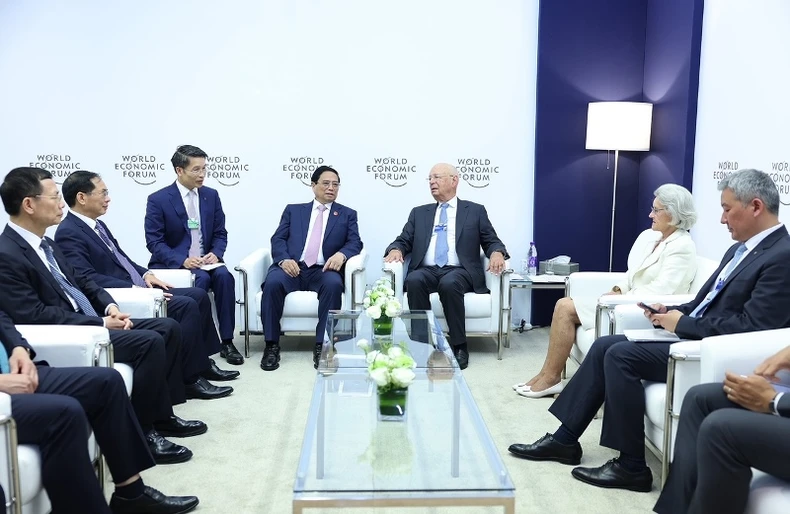 |
| Prime Minister Pham Minh Chinh received WEF Founder and Executive Chairman Klaus Schawab. |
Professor K.Schwab expressed his pleasure to meet Prime Minister Pham Minh Chinh again in China for the third consecutive time attending the WEF Annual Conference. The WEF founder expressed his impression of the Prime Minister’s messages at the Plenary Opening Session and the Prime Minister’s sincerity and openness in exchanges with WEF’s leading CEOs.
He said that WEF and its member corporations highly appreciate Vietnam’s prospects, investment and business environment and outstanding economic achievements; sees Vietnam as a model of a strongly developed economy and effectively takes advantage of the opportunities of the 4.0 Industrial Revolution.
Both sides are delighted with the important developments in the cooperative relationship between Vietnam and WEF in recent times, especially the signing of a Memorandum of Understanding (MOU) for the period 2023-2026 last year at the Conference. WEF Tianjin Conference.
The two sides agreed to promote the effective implementation of the MOU and coordinate to make the Industrial Revolution 4.0 Center in Ho Chi Minh City become the leading connection center in the region. WEF welcomes Vietnam’s participation in WEF’s Industrial Revolution 4.0 network and evaluates this as an opportunity for Vietnam to not only share technological knowledge but strengthen cooperation in science, technology and innovation. creative.
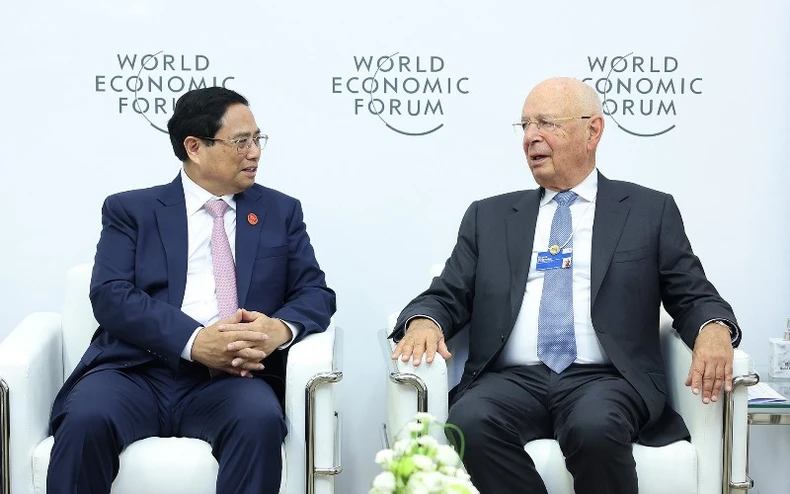 |
| Prime Minister Pham Minh Chinh and WEF Founder and Executive Chairman Klaus Schwab. |
On this occasion, Professor K.Schwab respectfully sent an invitation to Prime Minister Pham Minh Chinh to attend the World Economic Forum Annual Conference in Davos in 2025.
nhandan.vn


